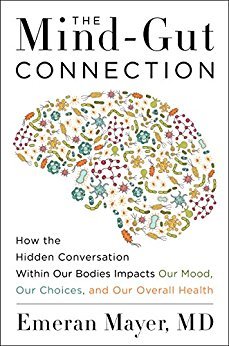More on this book
Community
Kindle Notes & Highlights
by
Emeran Mayer
Read between
March 13 - April 16, 2017
Food plays a key part in the health of our gut, our brain, and in the interaction of the two vital organs, and this close relationship starts the moment we are born.
the food the child receives from her mother plays a crucial role in this process.
it’s now clear that those first two
and a half to three years shape our gut microbiome for a lifetime.
We know today that it’s the infant’s food supply, in particular breast milk, which helps her gut fill with the initial healthy mix
of microbes.
Besides all the nutrients essential for the child’s development, breast milk contains
prebiotics—compounds
compounds with the ability to feed particular groups...
This highlight has been truncated due to consecutive passage length restrictions.
oligosaccharides—complex carbohydrates made of three to ten linked sugar molecules—that are essential in shaping the baby’s gut microbiota by selectively p...
This highlight has been truncated due to consecutive passage length restrictions.
These molecules resist the acidity in an infant’s stomach as well as digestion by pancreatic and small intestinal enzymes, reaching the end of the small intestine and colon
in an intact form.
they nourish beneficial microbiota, in particular Bifidobacterium species that are able to partially break them down into short-cha...
This highlight has been truncated due to consecutive passage length restrictions.
HMOs are the only food that has evolved strictly for the purpose of feeding the infant’s microbiota.
by favoring the dominance of Bifidobacterium infantis
preventing the growth of potentially harmful bacteria as they compete for a limited nutrient supply.
Can breastfeeding change the gut-microbiota-brain conversation to promote healthy development of critical brain circuits and systems? Long-term studies of breastfed infants suggest that it can.
The longitudinal studies on breastfed infants have shown that the longer an infant is breastfed, the larger his brain is, a trait associated with improved cognitive development.
Breastfeeding can even enhance a baby’s emotional and social
develo...
This highlight has been truncated due to consecutive passage length restrictions.
How does breastfeeding specifically alter the brain regions responsible for learning these skills?
it does so in part through the action of
oxyt...
This highlight has been truncated due to consecutive passage length restrictions.
Oxytocin promotes affiliation and bonding, suggesting that oxytocin release during nursing enhances mother-child bonding.
we found that there is a correlation between the volume of certain brain regions and the general composition of the gut microbiota.
several research groups investigated whether differences in dietary habits among people living in industrialized societies are reflected in changes in their gut microbiota and the metabolites they produce.
switching of individuals from their regular diet to either a plant- or an animal-based diet also changed their gut microbial composition.
the animal-based high-fat diet had a greater effect on people’s baseline microbiota composition and prevalence of certain species than the plant-based diet did, suggesting that it represented a greater deviation from the subjects’ default diet than the plant-based diet did.
The ability to quickly adapt to readily available plant foods during times of limited availability of meat may have provided an alternative source of calories and nutrients.
In short, diet changed the study subjects’ production of microbial metabolites without significantly changing the composition of the microorganisms that produced these metabolites.
Despite the adaptability of our microbiota, it’s also true that the microbiota of rural agrarians and hunter-gatherers have capabilities that we have simply lost.
People living in industrialized societies,
have a “restrictive” gut microbiota composition that is not as efficient in fermenting complex plant-based carbohydrates to short-chain fatty acids, even if you consume a lot of fruits, vegetables, and other plant-derived foods. How would such a restrictive composition develop?
All this means that when you are born into Western civilization, you acquire a Western microbiome as well. Even if you go vegan today, your gut microbiota will remain that of a typical omnivore, and even if you eat a paleo diet for the rest of your life, your gut microbiota won’t turn into that of a hunter-gatherer.
However, the pattern of microbial metabolites you produce depends on which diet you consume.
when it comes to your health, the identity of the microbial species matters less than the job that they do,
there’s good reason to assume that your gut metabolites will differ depending on what type of diet you eat.
it has been estimated that the human gut microbiome has the potential to produce some 500,000 distinct metabolites, known collectively as the
metabolome,
many of these metabolites are neuroactive, which means they can influenc...
This highlight has been truncated due to consecutive passage length restrictions.
These metabolites are produced by some 7 million genes, far more than the 20,000 in the human genome.
The diet you choose determines not only the tunes it plays, but
also the quality of these tunes. And you, ultimately, are the conductor of the symphony.
Our emotional states are closely related to our fat and sugar intake, and many of us aren’t paying enough attention to what we’re eating.
a diet high in animal fat can also contribute to overconsumption of food and even food addiction—and our gut microbes may play an important role in this connection.
recent epidemiological evidence suggest that diets low in animal fat, such as the Mediterranean diet,
Such diets are also associated with a lower risk for certain cancers and serious brain diseases such as depression, Alzheimer’s, and Parkinson’s disease.
a key link between the overconsumption of animal fats and the onset of disease—including
is a chronic state of low-grade inflammation.
highly addictive foods have completely altered our diet. This in turn has directly affected the interactions between our brains, our guts, and the microbiome.


